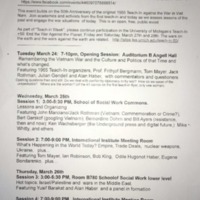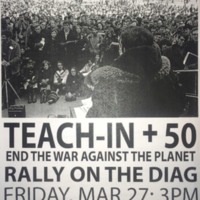Legacies of the Anti-Vietnam War Movement
A New Participatory Democracy
What effect did the anti-Vietnam War movement have on the United States, both in the 1960’s and later on? To appropriately address this question, we must examine how the anti-war movement changed how America views politics, activism, political participation, and intellectual and scholastic pursuits. The Port Huron Statement, the early formative document that provided a skeleton for the New Left, introduced concepts and mindsets that would affect later generations substantially. In an interview conducted in 2015 by our researchers, Tom Hayden, one of the original architects of the Port Huron Statement, argues that thanks to the efforts of the members of SDS gathered in 1962 in Port Huron, a new way of expressing oneself politically was created: “any time people feel deeply repressed, when they can’t enact change through politics… then they will resort to participatory democracy as the only way to express themselves."
Mass Mobilization, on National and Local Levels
The anti-Vietnam War movement increased political activism throughout the 1960’s and beyond. Through the organizing efforts of students, professors, and activists, events, such as, the 1965 Teach-In, the March on Washington, the International Days of Protest, and the 1968 Chicago Democratic Convention Protest were made possible. Furthermore, localized draft card burnings, ROTC protests, and attempts to end military recruitment and research on university campuses untied anti-war protestors of all demographics in the fight to stop the war in Vietnam. Professor Bill Gamson told our researchers in 2015 that the March 1965 Teach-in "demonstrated the possibility of mass opposition to unjust wars and the possibility of change."
Combining Education and Direct Action
Students for a Democratic Society, the lead student organization during the anti-Vietnam War movement, taught students how to organize, what methods were effective to educate a large number of citizens, and how to mobilize these citizens into impactful and direct action. Activists who participated in ERAP, for example, would often go on to participate in anti-poverty and urban improvement activism for the rest of their lives. In December 1964, PREP would help start the planning for the March on Washington, which would become a seminal moment in the progress of liberal thought and political participation. Paul Potter’s “Naming the System” speech demonstrated the transformation of SDS from a more passive, intellectual organization into one characterized by direct action and more active forms of protest. Potter’s speech also illustrates that concerned citizens would not just focus their efforts solely on the war, but rather invest their energy multilaterally in whatever issues concerned them. Some anti-war activists, motivated by the knowledge that one’s actions could help accomplish change, joined the fight against apartheid in South Africa. According to Tom Mayer in an interview conducted by our researchers in 2015, SDS “created a certain tradition of action” (Tom Mayer Interview). SDS taught us that we are not limited by traditional strictures of politics. We, as individuals and as a community, possess the fundamental right to impact our country and our government, and to create new modes of expressing ourselves and our ideas. The decisions made by policy-makers should be subjected to the examination and critique of the people that they profess to represent. SDS emphasized the spirit of democracy: a faith in the people to decide the correct path to take, and for everyone to be able to participate in the decisions that affect us all.
Where did the New Left and the Anti-Vietnam War Movement fail?
In the year 2015, America is still faced with racism, economic inequality, and a state of perpetual war. These were all facets of society that the New Left addressed in the Port Huron Statement, and continued to strive to change throughout the 1960's. Furthermore, sexism, climate change, and the disproportionate spending of money in politics are all more ills of society people are trying to address today. Several members of the New Left and anti-Vietnam War movement look back on their activism during the 1960's and see the lack of fundamental questioning of the origins of society's promblems as a major failure of the time. Professor John Vandermeer, who was interviewed by our researchers in 2015, sees the absence of more discussions about capitalism as a missed opportunity during the movement. Harvey Wasserman, another activist in SDS and the anti-war movement acknowledges cutural accomplishments of the New Left, but also recognizes that many problems of the 1960's are prevalent today. He states, "perpetual war, saftey net social security programs, the gap between rich and poor, these are issues you gotta work on."
Teach-in+50 flyers, from 2015, to commemorate the March 24th-25th, 1965 teach-in at the University of Michigan.
Citations for this page (individual document citations are at the full document links).
Interview of Tom Hayden by Obadiah Brown, Chris Haughey and Kevin Trierweiler March 29th, 2015, Ann Arbor, Michigan.
Interview of Tom Mayer by Obadiah Brown, Chris Haughey and Maria Buczkowski, March 25th, 2015, Ann Arbor, Michigan.
Interview of Bill Gamson by Maria Buczkowski, March 27th, 2015, Ann Arbor, Michigan.
Interview of John Vandermeer by Chris Haughey and Maria Buczkowski, April 7th, 2015, Ann Arbor, Michigan.
Interview of Harvey Wasserman by Chris Haughey and Obadiah Brown, March 28th, 2015, Ann Arbor, Michigan.


